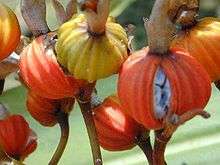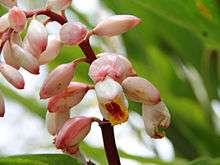Alpinia zerumbet
Alpinia zerumbet, commonly known as shell ginger, is a perennial species of ginger native to East Asia. They can grow up to 8 to 10 ft (2.4 to 3.0 m) tall and bear colorful funnel-shaped flowers. They are grown as ornamentals and their leaves are used in cuisine and traditional medicine. They are also sometimes known as the pink porcelain lily, variegated ginger or butterfly ginger.
| Alpinia zerumbet | |
|---|---|
| Shell ginger as a streetplant | |
 | |
| Shell ginger fruit dehiscing.[1] | |
| Scientific classification | |
| Kingdom: | Plantae |
| Clade: | Tracheophytes |
| Clade: | Angiosperms |
| Clade: | Monocots |
| Clade: | Commelinids |
| Order: | Zingiberales |
| Family: | Zingiberaceae |
| Genus: | Alpinia |
| Species: | A. zerumbet |
| Binomial name | |
| Alpinia zerumbet (Pers.) B. L. Burtt and R. M. Smith[2] | |
Characteristics
Native to eastern Asia, this plant is a rhizomatous, evergreen tropical perennial that grows in upright clumps 8 to 10 ft (2.4 to 3.0 m) tall in tropical climates. It bears funnel-formed flowers. Flowers have white or pink perianths with yellow labella with red spots and stripes.[3] There are three stamens, but only one has pollen. There is one pistil. The fruit is globose with many striations. In more typical conditions, it reaches 4 to 8 ft (1.2 to 2.4 m) feet tall in the green house, and 3 to 4 ft (0.91 to 1.22 m) feet tall, as a house plant.[4]
It was originally called Alpinia speciosa, which was also the scientific name of torch ginger. To avoid the confusion, it was renamed as A. zerumbet while torch ginger was reclassified in the genus Etlingera, no specie is called A. speciosa.[5]

Cultivation
Alpinia zerumbet is best grown in rich medium-wet, to wet well drained soils in full sun to part shade. Afternoon shade in hot summer climates, is recommended. Indoors, the plant must have bright light and humid conditions. Flowering rarely occurs before the second year.
Alpinia zerumbet is called a "shell ginger" or "shell flower" most commonly, because its individual pink flowers, especially when in bud, resemble sea shells. Other common names in English include "pink porcelain lily", "variegated ginger, "butterfly ginger", and "light galangal".
In Japanese it is known as gettō' (ゲットウ). In Okinawan, it is known as sannin. In Chinese, it is known as yàn shānjiāng (艳山姜) or yuetao (月桃).
Uses
The plant's long leaf blades are used for wrapping zongzi, a traditional Chinese dish made of rice stuffed with different fillings. In Okinawa, Japan, A. zerumbet is known in the local dialect as sannin, or in Japanese as getto. Its leaves are sold for making an herbal tea and are also used to flavor noodles and wrap mochi rice cakes.
Statistically, Okinawan natives who consume a traditional diet that includes shell ginger have a very long life expectancy.[6] Recent research has investigated its effects on human longevity and the phytochemicals that may be responsible.[7] There have also been investigations into its antioxidant and hypotensive properties which may be responsible for its effectiveness in traditional medicine.[8]
Gallery
- Shell ginger flowers
 Alpinia zerumbet variegata
Alpinia zerumbet variegata The inflorescence protected by two bracts before flower bloom.
The inflorescence protected by two bracts before flower bloom.
References
- "Alpinia zerumbet (shell ginger)". Hawaiian Ecosystems at Risk project. Retrieved March 19, 2011.
- "Alpinia zerumbet (Pers.) B.L. Burtt & R.M. Sm". United States Department of Agriculture, Natural Resources Conservation Service. Retrieved March 19, 2011.
- Jackes, Betsy (14 Dec 2012). "Alpinia zerumbet (Shell Ginger, Pink Porcelain Lily)". Discover Nature at JCU. Plants on Cairns Campus. Australia: James Cook University. Retrieved 17 May 2013.
- "Alpinia zerumbet (Pers.) B. L. Burtt & R. M. Sm". Encyclopedia of Life. Retrieved March 19, 2011.
- "有限会社月桃農園". www.gettou-farm.com. Retrieved 2020-07-07.
- Bouthier, Antoine. "Okinawan plant holds promise of elixir of youth". Business World Online. BusinessWorld Publishing. Retrieved 4 November 2018.
- Teschke, Rolf; Xuan, Tran Dang (2018). "Viewpoint: A Contributory Role of Shell Ginger (Alpinia zerumbet) for Human Longevity in Okinawa, Japan?". Nutrients. US National Institute of Health. 10 (2): 166. doi:10.3390/nu10020166. PMC 5852742. PMID 29385084.
- Kumar, Akhilesh; Bind, Vimala (11 September 2018). "Alpinia zerumbet an essential medicinal herb". MOJ Toxicology. 4 (5): 316. Retrieved 4 November 2018.
External links
| Wikimedia Commons has media related to Alpinia zerumbet. |
| Wikispecies has information related to Alpinia zerumbet |
- Alpinia zerumbet (Pers.) Burtt. et Smith Medicinal Plant Images Database (School of Chinese Medicine, Hong Kong Baptist University) (in Chinese) (in English)